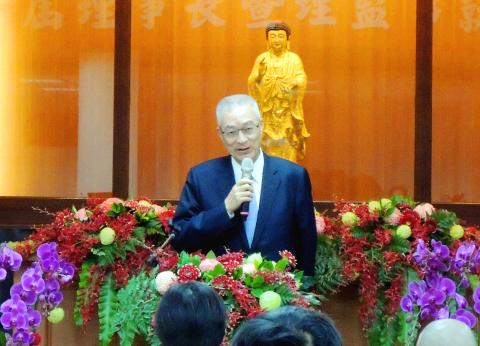Vice President Wu Den-yih (吳敦義) yesterday said that he would not take part in the Chinese Nationalist Party’s (KMT) presidential primary, ending speculation on his run for the top office next year.
“No. Amitoufo,” Wu said to reporters on the sideline of a Buddhist event in Taichung, invoking a Buddhist mantra.
It was the first time that Wu gave an unequivocal answer to a question he has been asked repeatedly while the KMT has not announced a candidate.

Photo: CNA
Wu became the second expected presidential contender to abstain from the election.
New Taipei City Mayor and KMT Chairman Eric Chu (朱立倫) last month said that he would not run in the election in January next year.
Former health minister Yaung Chih-liang (楊志良) and Deputy Legislative Speaker Hung Hsiu-chu (洪秀柱) have signed up for the KMT primary, while other KMT members with little political experience have picked up registration forms.
The registration period, which opened on April 20, is to close on May 16.
Results of the party primary are to be calculated from public opinion polls and a vote by party members. The party vote is to count for 30 percent of a candidate’s total score, while public opinion polls are to contribute 70 percent.
The opinion polls are to be conducted from June 5 to June 13, and party members are to vote on June 14.
Results are to be announced on the same day as the vote.
Party watchers and commentators also consider Legislative Speaker Wang Jin-pyng (王金平) to be a likely contender, although he has remained tight-lipped about his intentions.
Separately yesterday, reporters asked former president Lee Teng-hui (李登輝) whether he considers Wang a good presidential candidate.
“It is up to everybody’s judgement; do not get me involved in the propaganda,” Lee said.
Despite his reluctance to weigh in on the matter, Lee said Wang has “qualities that a leader should carry.”
Wang, thanking Lee for his positive remarks, said he that had not met with Lee for more than a year before seeing him at a conference in Taipei yesterday.
Nothing about the presidential election was discussed, Wang added.
Additional reporting by Alison Hsiao

The High Prosecutors’ Office yesterday withdrew an appeal against the acquittal of a former bank manager 22 years after his death, marking Taiwan’s first instance of prosecutors rendering posthumous justice to a wrongfully convicted defendant. Chu Ching-en (諸慶恩) — formerly a manager at the Taipei branch of BNP Paribas — was in 1999 accused by Weng Mao-chung (翁茂鍾), then-president of Chia Her Industrial Co, of forging a request for a fixed deposit of US$10 million by I-Hwa Industrial Co, a subsidiary of Chia Her, which was used as collateral. Chu was ruled not guilty in the first trial, but was found guilty

DEADLOCK: As the commission is unable to forum a quorum to review license renewal applications, the channel operators are not at fault and can air past their license date The National Communications Commission (NCC) yesterday said that the Public Television Service (PTS) and 36 other television and radio broadcasters could continue airing, despite the commission’s inability to meet a quorum to review their license renewal applications. The licenses of PTS and the other channels are set to expire between this month and June. The National Communications Commission Organization Act (國家通訊傳播委員會組織法) stipulates that the commission must meet the mandated quorum of four to hold a valid meeting. The seven-member commission currently has only three commissioners. “We have informed the channel operators of the progress we have made in reviewing their license renewal applications, and

‘DENIAL DEFENSE’: The US would increase its military presence with uncrewed ships, and submarines, while boosting defense in the Indo-Pacific, a Pete Hegseth memo said The US is reorienting its military strategy to focus primarily on deterring a potential Chinese invasion of Taiwan, a memo signed by US Secretary of Defense Pete Hegseth showed. The memo also called on Taiwan to increase its defense spending. The document, known as the “Interim National Defense Strategic Guidance,” was distributed this month and detailed the national defense plans of US President Donald Trump’s administration, an article in the Washington Post said on Saturday. It outlines how the US can prepare for a potential war with China and defend itself from threats in the “near abroad,” including Greenland and the Panama

A wild live dugong was found in Taiwan for the first time in 88 years, after it was accidentally caught by a fisher’s net on Tuesday in Yilan County’s Fenniaolin (粉鳥林). This is the first sighting of the species in Taiwan since 1937, having already been considered “extinct” in the country and considered as “vulnerable” by the International Union for Conservation of Nature. A fisher surnamed Chen (陳) went to Fenniaolin to collect the fish in his netting, but instead caught a 3m long, 500kg dugong. The fisher released the animal back into the wild, not realizing it was an endangered species at